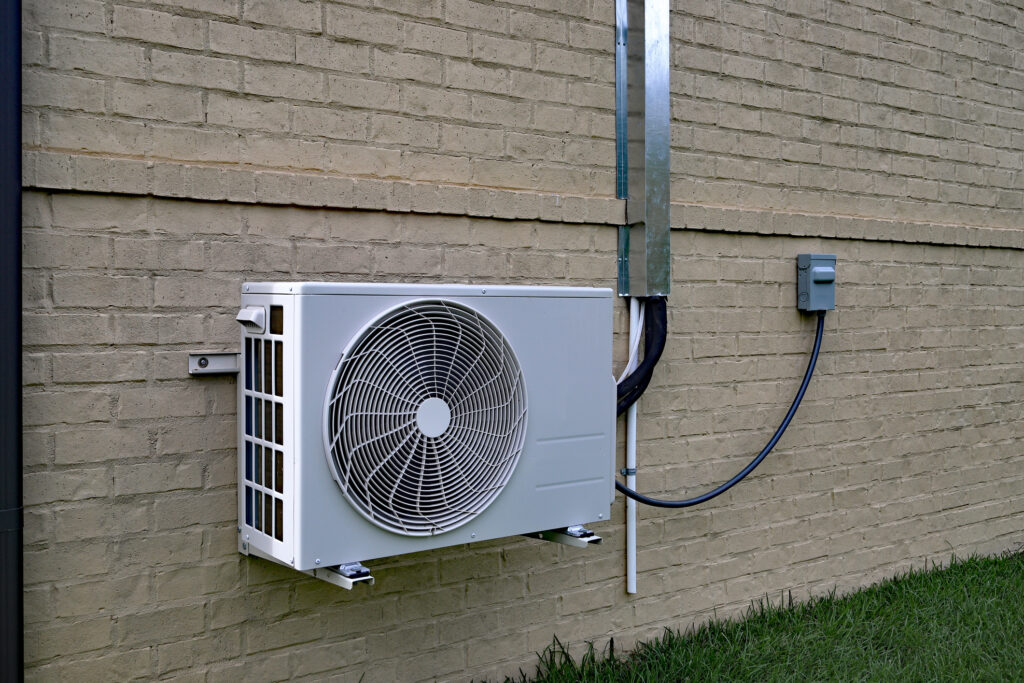Ductless HVAC and Indoor Air Quality: Improving Your Home’s Air
What if you could improve indoor air quality with just one simple upgrade to your home’s heating and cooling system? With a ductless HVAC system, you can do just that. Not only will it provide more efficient heating and cooling, but it also has the potential to improve the overall air quality in your home massively. But first things first, what exactly is a ductless HVAC system?

What is a Ductless HVAC System?
A ductless HVAC system, also known as a mini-split system, is a heating and cooling system that does not require ductwork to distribute air throughout your home. Instead, it uses individual indoor units connected to an outdoor unit by refrigerant lines. These units can be mounted on walls, ceilings, or floors and are controlled by a remote or thermostat.
Now that we’ve covered what a ductless HVAC system is and how it operates let’s delve a bit deeper into how exactly it improves your home’s indoor air quality. Understanding this can help you decide whether a ductless HVAC system is the right choice for your home.
Understanding Indoor Air Quality
Indoor air quality is an important aspect of our overall health and well-being. The air we breathe inside our homes can be affected by various factors such as pollutants, humidity levels, and ventilation, to name a few. The presence of pets, mold, and other allergens can also make the situation worse.
Whether we like it or not, poor indoor air quality can lead to respiratory issues, allergies, and other health problems. According to the EPA, the levels of indoor air pollutants can be 2-5 times higher than outdoor levels, making it crucial to put some time and effort into this. How can a ductless HVAC system help with this?
How Ductless HVAC Systems Improve Indoor Air Quality
1. Reducing Pollutants
One of the main ways that a ductless HVAC system improves indoor air quality is by reducing the number of pollutants in your home. Traditional heating and cooling systems can accumulate dust, allergens, and other particles in their ductwork, which can then be circulated throughout your home. Ductless systems eliminate this issue by not using ducts at all, reducing the potential for pollutants to build up and circulate.
2. Zoned Heating and Cooling
Another benefit of ductless HVAC systems is that they allow for zoned heating and cooling. This means you can control the temperature in individual rooms or areas rather than heating or cooling your entire home. This not only helps with energy efficiency but also allows you to target specific areas for improved air quality. For example, if someone in your household has allergies, you can set a higher fan speed and temperature in their room to filter out more particles.
3. Easy Maintenance
Ductless systems are also easier to maintain, which can contribute to better air quality in your home. Traditional HVAC systems require regular duct cleaning, which can be a hassle and is often neglected. Ductless systems only have small filters that need to be cleaned or replaced regularly, making it easy to keep up with maintenance and ensure clean air in your home. Imagine changing your filter as easily as you would a light bulb – that’s the kind of convenience ductless systems offer.
4. No Leaks or Gaps
Ductwork can develop leaks and gaps over time, leading to air leakage and decreased efficiency. These leaks affect energy efficiency and allow pollutants and allergens to enter your home. Ductless systems don’t have this issue since they don’t use ducts. This means the air circulating in your home is free from outside pollutants, ensuring cleaner and healthier indoor air quality.
5. No Cross-Contamination
With traditional HVAC systems, there is a risk of cross-contamination between rooms through the ductwork. This means that allergens or pollutants from one room can be circulated into other areas of your home. Ductless systems eliminate this issue since each unit only serves one particular zone and does not connect to other areas. This can greatly improve indoor air quality and provide a healthier living environment for you and your family.
Final Word
In conclusion, indoor air quality is an important factor to consider when choosing a heating and cooling system for your home. Ductless HVAC systems offer many benefits that can contribute to better air quality, such as improved filtration, zoned heating and cooling, and easy maintenance. By opting for a ductless system, you can ensure that your family is breathing in clean and healthy air, minimizing the risk of allergies and respiratory issues.
Get In Touch With Our Team Today For 5-Star Indoor Air Quality
Here at Robert B Payne, not only do we understand the importance of indoor air quality, but we also specialize in installing and maintaining ductless HVAC systems. Our team of experts is dedicated to providing top-notch services focusing on customer satisfaction.
If you want to improve your home’s air quality, don’t hesitate to contact us today for more information or to schedule an appointment. Breathe easy with Robert B Payne! So why wait? Call us today at 540-373-5876, and let us take care of the rest.

